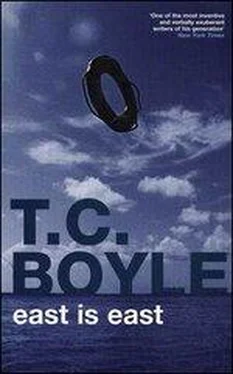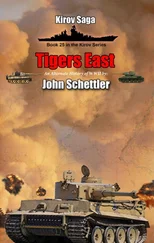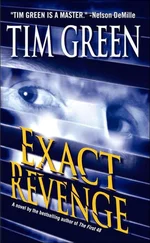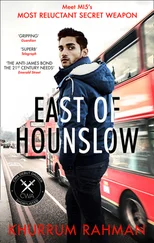Tom Boyle - East is East
Здесь есть возможность читать онлайн «Tom Boyle - East is East» весь текст электронной книги совершенно бесплатно (целиком полную версию без сокращений). В некоторых случаях можно слушать аудио, скачать через торрент в формате fb2 и присутствует краткое содержание. Жанр: Современная проза, на английском языке. Описание произведения, (предисловие) а так же отзывы посетителей доступны на портале библиотеки ЛибКат.
- Название:East is East
- Автор:
- Жанр:
- Год:неизвестен
- ISBN:нет данных
- Рейтинг книги:5 / 5. Голосов: 1
-
Избранное:Добавить в избранное
- Отзывы:
-
Ваша оценка:
- 100
- 1
- 2
- 3
- 4
- 5
East is East: краткое содержание, описание и аннотация
Предлагаем к чтению аннотацию, описание, краткое содержание или предисловие (зависит от того, что написал сам автор книги «East is East»). Если вы не нашли необходимую информацию о книге — напишите в комментариях, мы постараемся отыскать её.
, praised by
in
as "one of the most exciting young fiction writers in America," the result is a sexy, hilarious tragicomedy of thwarted expectations and mistaken identity, love, jealousy, and betrayal.
East is East — читать онлайн бесплатно полную книгу (весь текст) целиком
Ниже представлен текст книги, разбитый по страницам. Система сохранения места последней прочитанной страницы, позволяет с удобством читать онлайн бесплатно книгу «East is East», без необходимости каждый раз заново искать на чём Вы остановились. Поставьте закладку, и сможете в любой момент перейти на страницу, на которой закончили чтение.
Интервал:
Закладка:
It couldn’t have gone any better for Ruth, queen of the hive once again—she was even readying herself to grant the inevitable and gracious billiard-room audience to Jane Shine later that night, or maybe she’d snub her, maybe she would—it couldn’t have gone any better, till there came a single wild shout from out beyond John Berryman that grew immediately into a chorus of cries and lamentation and gave rise in the next moment to a parade of footsteps storming the patio. “What is it?” someone cried, and Ruth saw the sheriff’s face, wild and white, Abercorn’s, Turco’s, their mouths drawn tight and eyes rabid, and then the sheriff seized on her, Ruth, as the first face he recognized. “The phone,” he barked, “where’s the phone?”
She was frozen. They were at her again, at her like hounds. Everything broke down in that instant, faces flapping round her like sheets in the wind. “Phone?” she repeated, stupid, dazed.
“Goddamn it, yes,” he snarled, looking on her with hatred, real hatred, before turning away in disgust and seizing on Laura Grobian. And then he was turning wildly away from her too, flailing his arms at the crowd gathered there on the patio with their sweet drinks and snifters of swirling dark cognac. “I need your help, all of you,” he cried, and then his voice dropped down to nothing and he finished the thought as if he were talking to himself, “—the son of a bitch is gone and got himself loose again.”
Four Walls
They’d caught him. run him down. overwhelmed him with their guns and their dogs and their Negroes. They’d caught him, yes. Oh, yes. Slapped him, handcuffed him, jerked their elbows into his ribs, his gut, the small of his back. They shoved him, abused him, humiliated him, made him walk the gauntlet of them as if they were red Indians in the forest, jeering and spitting and cursing him for a Jap, a Nip, a gook and a Chinaman. Yes. But they weren’t red Indians. They were white-faced and black-faced, blue-eyed, kinky-haired, they stank of butter and whiskey and the loam that blackened their fingernails, and it was they who’d exterminated the red Indians with a ferocity so pitiless and primeval it made the savages seem civilized. Yes. Oh, yes. And they hated him. Hated him so deeply and automatically it froze his heart: this was American violence, bred in the bone. This was the mob, the riot, this was dog eat dog.
The hate. It took him aback, it did. He was like them—that was the whole point, couldn’t they see that? He was a mutt too. But they didn’t see it, didn’t care. They cuffed him and shoved him and spat their curses at him and he saw the hate in their cold rinsed-out hakujin eyes, saw it in the black stony glare of the Negroes: he was an insect, a snake, something to be stepped on and ground into the dirt, eliminated. The face of the Negro boy had been almost ecstatic with hate as he crouched there in the path, consumed in his passion, implacable, worse even than the dogs. (They were there too—right there, right in Hiro’s face—choking back snarls and drool and breath that stank of meat gone bad, trembling all over with the urge to fall on him and tear him to pieces.) Uncle! the boy kept shouting, as if it were some sort of war cry, Uncle! Uncle!, his fists clenched, his eyes hard, tongue swollen, his very blood turned to acid with the ferocity of his hate.
And then there was the puffed-up little man in fatigues who pulled the boy off him and forced his wrists into the handcuffs, and the other Negro who called off the dogs, and the spatterface from the INS and the sheriff too: there was no glimmer of humanity in any of them. They’d never smiled, laughed, enjoyed a meal, friendship, love or affection, never petted a dog, stroked a cat or walked a child to school. They were hunters. Killers. And Hiro was their quarry, foreign and strange and worth no more time or thought than a cockroach dropped from the ceiling into their morning grits.
Their hands were on him, firm hands, iron hands, and the cuffs bit into his wrists. The sheriff hauled him to his feet and walked him back down the path, grim and purposeful, jerking impatiently at his manacled forearm while a deputy prodded him from behind. Hiro could hear them hooting and cursing and shooting off their weapons somewhere up ahead, but then the sheriff called out to them in a fiery hoarse shout and the noise of the guns abruptly ceased, lingering for a moment as echo and then fading away to stillness. A hush fell over the morning and all at once Hiro was afraid. He held the fear in a lump inside him, a tumor of fear, and he bowed his head and concentrated on his feet.
The man in fatigues and the boy with the dogs had fallen into step behind Hiro and the sheriff—they were quiet now, the dogs, whining and panting like housepets out for a stroll in the park—and behind them were the agency man and the spidery Negro boy whose towering unquenchable Amerikajin hate had brought Hiro down. It was a parade, that’s what it was. Grim, silent, angry, a parade in celebration of hate. But Hiro had no time to get philosophical about it—already they were emerging on the clearing at Ruth’s place and a murmur went up around him. He kept his eyes on the ground, but he could feel the presence of them, black and white, a mob of them, and he could smell the gunsmoke on the air. No one spoke. No one cursed or abused him. And then suddenly a man dried up like a stick of firewood stepped in front of him—“You Jap bastards kilt my brother Jimmy,” he snarled—and Hiro felt a stitch in his side, the elbow to the kidney, and then all the rest of them were spewing it at him—hate—until the sheriff got him in the car and out of there, out of the jungle and down the black macadam road to the cell that awaited him.
And now, here he was, in a gaijin cell, fulfilling his destiny.
From the storage room of the Tokachi-maru to the big bedroom at Ambly Wooster’s to the cramped loveseat at Ruth’s to this joyless cubicle of rotten mortar and stone, he was a prisoner in perpetuity, hopeless and defeated. The City of Brotherly Love was an illusion, a fairy tale—he saw that now. And then he thought of Jōchō and Mishima. In defeat, there was only one path to honor, and that was death. Mishima had addressed the soldiers of the Self-Defense Forces on the day he died, exhorting them to join him in rising up to purify Japan, and when they didn’t join him, when they laughed and jeered, he’d turned a sword in his own guts and made a mockery of them all. Alone in his cell with the stirrings of his guilt and shame, Hiro fell back on Jōchō. He didn’t have the battered and stained little volume—the sheriff had taken it from him, along with the picture of Doggo and the few odd little coins he’d got back from the girl in the Coca-Cola store—but he knew the formula, knew it by heart. The more they hated him, the more Japanese he became.
It couldn’t have been much past seven in the morning and the heat was like a weight on him already, pounds per square inch, a measure of his defeat. He sat there on the stone floor and pressed tentatively at his stomach, feeling a sword there, feeling liberation and honor, and something else too: hunger. Stinking and mud-encrusted, bruised, flayed and terrorized, humiliated to the point at which there was no alternative but suicide, he was hungry. Hungry. It was an embarrassment. A joke. The urgings of life crowding in on a funerary rite, a preparation for death gone up in dreams of sweet bean cake and ice cream.
Well, all right. Perhaps he wasn’t defeated yet. It was all in the interpretation, wasn’t it? Small matters should be taken seriously, Jōchō said. Well, then, his hunger was a small matter, and he would take it very seriously indeed—and the larger matter, the matter of his solitary and eternal fate, he would take lightly. As for the smaller matter, he was sure they would feed him something—not even the hakujin could be so barbaric as to let a prisoner starve to death. And as for the larger matter, he would have the right to a fair trial, wouldn’t he? He thought about that a moment, a fair trial, justices in their funereal robes, a jury of long-noses empaneled to vent their hate on him, Hiro Tanaka, the victim, the innocent, the happa from Japan trussed up like a turkey and studying the scuffed tiles of the courtroom floor as if their pattern would somehow reveal the solution to his predicament… and then all at once a glorious notion came into his head, a notion that tossed off fair trials, fuming sheriffs, dogs and Negroes and gun-toting crackers as if they were so much refuse, the outer wrapping of a morsel so sweet and nourishing it inflated his hara just to think about it: he would escape.
Читать дальшеИнтервал:
Закладка:
Похожие книги на «East is East»
Представляем Вашему вниманию похожие книги на «East is East» списком для выбора. Мы отобрали схожую по названию и смыслу литературу в надежде предоставить читателям больше вариантов отыскать новые, интересные, ещё непрочитанные произведения.
Обсуждение, отзывы о книге «East is East» и просто собственные мнения читателей. Оставьте ваши комментарии, напишите, что Вы думаете о произведении, его смысле или главных героях. Укажите что конкретно понравилось, а что нет, и почему Вы так считаете.











